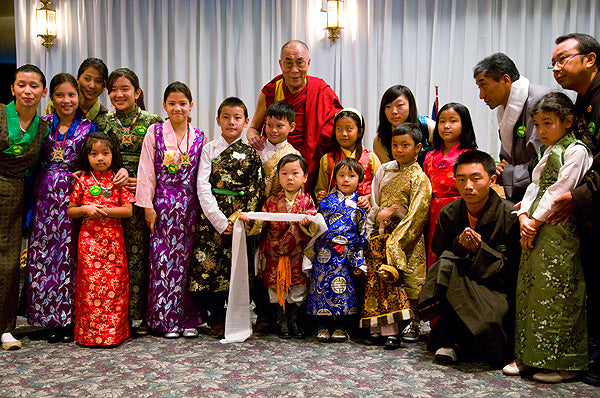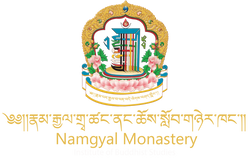The course will be titled ‘Summer Tibetan Study Program - 2024 Date: (Sunday- July 28 to Saturday - August 10, 2024) for Two Weeks.
Couldn't load pickup availability
The course will be titled ‘Summer Tibetan Study Program - 2024
DATE : Duration (Sunday- July 28 to Saturday - August 10, 2024) for Two Weeks.
Participants must report: to Namgyal Monastery, 201 Tibet Drive, Ithaca New York on July 28 (Sunday) before 4pm and plan to leave on August 10, 2023 (Saturday) before 3pm. Ithaca local Bus station to Namgyal Monastery is 15 minutes drive.
Eligibility Requirements: Any Tibetan student above 12 to 19years of age is qualified to apply for this course. The course instruction will be bilingual; English and Tibetan. This program is not suitable for a student below 12 years of age, parents are strongly recommended not to send your kids if they are below 12 years of age.
Cost of the Program: Each student is required to pay fee of US$1,400 for two weeks program, which includes a decent accommodation, foods and tuition fees. All other cost such as domestic airfares and bus fares has to be borne by the applicant. Please note the payment should be made in favor of “Namgyal Monastery – Summer Tibetan Study Program.
1) Double room: Two to Four students share a room furnished with A.C. & Common bathroom.
2) Food: in the common kitchen:
3) Field trips: A trip to Cornell University, Ithaca College and State Parks and Tourist sites.
Courses;
1. Meditation Course:
1. Meditation Course The primary focus of this course will be how one can achieve a deeper level of mental peace, tranquility and stability through the implementation of tools and methods which are found in Tibetan Buddhism. The class will also discuss traditional methods on how one can enhance loving kindness, compassion and warm heartedness feeling which are basic source of joy for oneself and for the others at large. As such in each session, in addition to lectures by and discussion sessions with visiting faculty, there will be short guided meditation.
Reference Material: Gen Lamrinpa, Calming the Mind: Tibetan Buddhist Teachings on the Cultivation of Meditative Quiescence, Snow Lion Publications (recommended buying)
2. Tibetan Language for Beginners and Intermediate:
This course is intended as an introduction/intermediate level on spoken and written Tibetan. The course will meet 1Half hours daily and will include Tibetan grammar, reading, writing, speaking and oral comprehension. Reference Material: Snow Lion Publication – for beginners and intermediate Tibetan Language Book.
3. TIBETAN HISTORY AND POLITICS - Tibetan Culture and Civilization:
·Basic Introduction to Tibetan History: Participants will be introduced to important phases of Tibetan history, including the reigns of Tibetan religious kings, era of fragmentation after the collapse of the Tibetan Empire and reign of His Holiness the Dalai Lamas. To make this session interactive, the lecture will be limited to 15-20 minutes and a group of three students will be asked to make presentations on what phases of Tibetan history that they consider outstanding and why.
· Tibet, China and International Community: Where does Tibet stand in terms of global recognition and support on the Tibet issue? Will the hardline policies of the Chinese government on Tibet ever change and what are the obstacles in finding an amicable solution? Students will understand the fundamentals of China’s position and policies on Tibet and the reasons why Tibet issue remains unresolved. They will also be introduced to the prevalent international support for the Tibetan cause.
· Role of Democracy in Tibetan Society: Democracy is considered a cure for many ailments in a society. For Tibetans, democracy plays an even greater role in ensuring the continuity of our freedom struggle and sustainability of a robust Tibetan community. Participants will not only be introduced to the democratic institutions in exile but also the significant contributions these institutions have made in gaining credibility to our just cause. They will be given exercise on what form of democracy suits best for the Tibetan people and what challenges do we face with the current democratic system.
· Tibetan Culture and Civilization: This course comprises a study of the history, politics, religious traditions, artistic practices, and social institutions of contemporary Tibetans. However, in order to contextualize this material, historical background, cultural practices, and institutions of Tibet (both before and after the Chinese government established the Tibetan Autonomous Region) will be studied as well.
· Function of Central Tibetan Administration: When the Communist China invaded Tibet in 1959, His Holiness the Fourteenth Dalai Lama sought asylum in India. Few senior officials of the Tibetan Government accompanied and followed him into exile, along with over 80 thousand Tibetans. On 25 April 1959, His Holiness the Dalai Lama called an emergency meeting of the few senior Tibetan officials to discuss about the reconstruction of Tibetans in exile. Soon after the meeting, Central Tibetan Administration was established in a reorganized form of the old centralized Tibetan Government, to meet both immediate and long-term needs of the Tibetan people. His Holiness remained as the Head of the State and executive powers were vested upon Kashag, consisting of three lay and two monk officials. Kalons were all appointed by His Holiness the Dalai Lama.
4. Tibetan Buddhist Philosophy - Debate and Practice:
The Buddhist tradition has evolved a profound understanding of the inner world of mind and ways to transform it, science has developed sophisticated understanding of the material world. Both science and Buddhism share as a fundamental aim the contribution they can make to humanity’s well-being. Reference book will be ’The Universe in a Single Atom’ by His Holiness the Dalai Lama.
5. The Four Principal Commitment of His Holiness the Dalai Lama.
1) The Promotion of Human Values : As a human being, His Holiness is concerned with encouraging people to be happy—helping them understand that if their minds are upset mere physical comfort will not bring them peace, but if their minds are at peace even physical pain will not disturb their calm. He advocates the cultivation of warm-heartedness and human values such as compassion, forgiveness, tolerance, contentment and self-discipline. He says that as human beings we are all the same
· Compassion
· Self -discipline
· Forgiveness
· Contentment
· Tolerance.
2. The Promotion of Religious Harmony
As a Buddhist monk, His Holiness is committed to encouraging harmony among the world's religious traditions. Despite philosophical differences between them, all major world religions have the same potential to create good human beings. It is there for important for all religious traditions to respect one another and recognize he value of their respective traditions. The idea that there is one truth and one religion is relevant to the individual practitioner.
3. Preservation of Tibetan Buddhist Culture, Language and Heritage
His Holiness is a Tibetan and as the ‘Dalai Lama’ is the focus of the Tibetan people’s hope and trust. Therefore, he is committed to preserving Tibetan language and culture, the heritage Tibetans received from the masters of India's Nalanda University, while also speaking up for the protection of Tibet's natural environment.
4. Revival of Ancient Indian Tradition
His Holiness the Dalai Lama has always expressed profound admiration towards ancient Indian knowledge for its contribution toward the understanding of the human mind, and the imbibing of practices to tackle negative emotions. His Holiness is convinced that the rich ancient Indian understanding of the working of the mind and emotions, as well as the techniques of mental training, such as meditation, developed by Indian traditions, are of great relevance today. Since India has a long history of logic and reasoning, he is confident that its ancient knowledge, viewed from a secular, academic perspective, can be combined with modern education.
6. Buddhism as a Science of Mind & Neurobiology of Meditation:
Buddhism is a journey into the depths of one’s heart and mind, the inner reality of one’s essence, an exploration of who we are and what we are. This spiritual journey is nothing more and nothing less than discovering this inner reality. Buddhist spiritual teachings present a genuine science of mind that allows one to uncover this inner reality, the nature of the mind and the phenomena that our mind experience.
Fundamentally it is the science of working with the very basic nature of our mind. "Nangpa" – Insider. The Tibetan term for Buddhism illustrates the nature of this inner science. What we call Buddhism in Tibetan is nang pa, which means insiders. Therefore we can see what Buddhism is fundamentally, from this term, insider: it is a science, working with our mind, a philosophy of humanity, a human science
During the past three decades there has been considerable research on the on the health and mental health benefits of meditation practices. This intensive teaching will provide participants with a practical understanding of the neural structure and processes and how these relate to changes that can occur in the brain with meditation practice. We will review the basic of neurobiology such as neuron function and coding, communication between neurons and the processes that underlie changes in neural connections. We will also then examine the brain structures and circuits related to various types of experience including attention, emotions, memory and social relationship and relate these to different types of meditation.
Resource Persons:
Geshe Lharampa Jamyang Dakpa
2. Venerable Tenzin Choesang – President of Namgyal Monastery
3. Namgyal Monastery School Dharamsala - Principal Ven, Thupten Yarphel
4. Venerable Kunga Gyatso
5. Venerable Nyima Tsering
6. Venerable Namgyal Tsering
7. Palden Oshoe – Translator
8. Kungo Kasur Lobsang Nyndak – Ex - President of Tibet Fund
9. Bhuchung Tsering – International Campaign for Tibet
10. Deana Bodnar - Neurobiology
11. Clint Sidle – Cornell University
12. Sidney Piburn – Snow Lion Publication.
Namgyal Monastery Institute of Buddhist Studies, Ithaca, NY.
Registration Form: 2024 Summer Tibetan Study Program: Registration will begin from 1st May 2024.
Last Name: _________________________________________________________
First Name:_________________________________________________________
Date of Birth: ___ /___ /__ __ __ __ Gender: Male Female (MM/DD/YYYY)
Father’s Name:__________________________________________________
Mother’s Name: _________________________________________________
Tel #: ______________________ E-mail address: _____________________________________
Mailing Address: _________________________________________________________________ ______________________________________________________________________________
Dietary Restrictions: ____________________________________________________________
______________________________________________________________________________
Allergies, if any: _________________________________________________________________ ______________________________________________________________________________
Anything, you wish to make us aware about you: __________________________________________________________________________________ __________________________________________________________________________
Declaration: I understand that the Namgyal Monastery Institute of Buddhist Studies will make my stay at Namgyal Monastery, Ithaca, NY for Summer Study program. However, should any unforeseen tragedy strike, I will take full responsibility. I authorize the Namgyal Monastery to give me medical treatment, if required.
______________________________ _________________________________
Signature of the participant Signature of the parent / Legal guardian
____ / ____ / __________
Dated: (MM/DD/YYYY)
Please mail your application form along with the check of $1,400 to:
Namgyal Monastery Institute of Buddhist Studies
201 Tibet Drive, Ithaca, NY 14850
If you have any questions you are requested to Email: office@namgyal.org OR Call 607-272-2785


